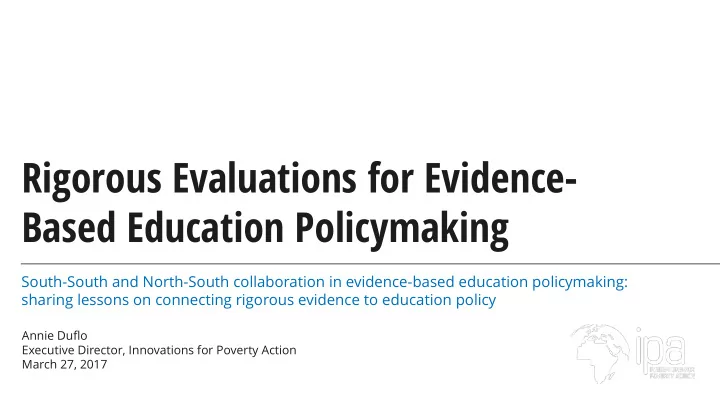

Rigorous Evaluations for Evidence- Based Education Policymaking South-South and North-South collaboration in evidence-based education policymaking: sharing lessons on connecting rigorous evidence to education policy Annie Duflo Executive Director, Innovations for Poverty Action March 27, 2017
OUR MISSION To disco cover and promote effe ffect ctive so soluti tions to s to g global p poverty ty pr proble blems.
1 We create high-quality evidence. 2 We help turn that evidence into better programs and policies for the poor.
Extensive Collaboration Service Academics Providers e.g. MIT, Harvard, e.g. CARE, Oxfam, Yale, University of local nonprofits & Ghana businesses Government Funders Agencies e.g. Gates, USAID, e.g. Ministry of Hewlett, Family Education, Ghana & Foundations, Ministry of Health, Individuals Zambia
Over 700 Studies • Across Program Areas: Agriculture, Education, Finance, Governance, Health, Peace & Recovery, Small & Medium Enterprises, Social Protection • 50+ Studies in Education
How do you measure impact? The critical question of impact evaluation: What would have happened in the absence of the program? If we want to know how effective a program is, we need a comparison group: a group of people who in the absence of the program have had outcomes similar to those who received the program.
Evaluating a program with a randomized evaluation
Understanding the results of a randomized evaluation 1. The group we are looking at is divided randomly in two 2. One group receives the program or intervention 3. Outcomes for both groups are measured for impact
What does it take to move evidence to impact? Educators, policymakers, and researchers who… Co-create credible, relevant, rigorous evidence Engage closely—before, during, and after research studies—to build buy-in and commitment to applying results Build capacity to incorporate rigorous evidence into education policy and practice
Recommend
More recommend